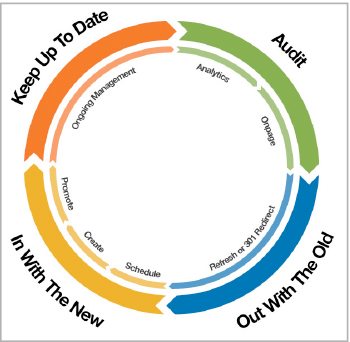With UK SEO Agency, QueryClick, we are putting together easy to follow snippets of expert advice across a range of search marketing disciplines including search engine optimisation, paid advertising, customer relationship optimisation, content strategy and analytics.
In this post, we cover five simple tips that will help you develop a website’s backlink profile, whilst keeping it ethical by sticking to the appropriate webmaster guidelines.
Have you read any Webmaster Guidelines?
To begin, it’s vital that your link building strategy remains 100 per cent ethical at all times. Therefore, we would highly advise reading up on the webmaster guidelines provided by the major search engines, such as Bing and Google. This will ensure that there is zero chance of any manual or algorithmic penalty being placed on your website.
Whatever strategy is currently in place, it would be incredibly frustrating to lose years of work as a result of a demotion within the search engine results pages. So try and keep up-to-date and know the difference between the ethical and unethical means of link building.
Building a natural backlink profile is key to creating sustainable rankings within the search engine results pages
This touches upon the previous tip. Search engine algorithms have advanced a lot in recent years and can detect numerous kinds of patterns and unethical activities that break the webmaster guidelines. Therefore, it’s wise to avoid the older link building techniques, such as:
• article spinning
• mass directory submissions
• buying links
Don’t fall into the trap of believing that building a set number of links per month/year is the road to success. Doing so will only leave you chasing your tail.
Instead, the aim should be to source a range of backlinks from relevant and authoritative websites. These will help build trust and act as a clear quality signal towards your website.
It is vital to create a link building strategy that focuses on long-term goals and combines a variety of activities and functions. These include building long-term relationships and being pro-active with existing and new content, whilst also leveraging social media and other means of outreach.
Don’t forget that content plays a significant role in every SEO campaign. As they say, “content is king”
The importance of content is often underestimated and many times considered an after-thought, especially when there is a new site build planned. However, the implementation of a content strategy should always be at the heart of every SEO campaign.
Updating existing content and creating new content, including resources, on a website is a great way to keep content fresh and can also be a great way to build assets that can provide a lot of value over time, especially when you consider fresh content being a ranking factor.
Content can be used to bolster link building activities to help increase a website’s competitive edge, and its ability to attract links. For example, creating what is known as ‘evergreen content’, ranging from simple step-by-step guides to content that may have a seasonal element, can help reduce any gaps or reduce what may have previously been thin content, thus creating focus and drive that will become part of a long-term link building strategy.
Don’t forget, out-of-date web pages may drive visitors away, and reduce conversions.
We believe that link building accounts for 55 per cent of the SEO mix.

The SEO mix is split between technical elements (10%), on-page work (35%), and linkbuilding (55%). Search engine optimisation involves a complex blend of activities that will be carried out at specific points during an SEO campaign, with each playing an important role regarding search engine performance. Therefore, understanding the importance of link building is important, but ensuring the foundations are built right is the only way to improve within the search engines.
Try weeding out your very own website’s backlink profile
If you own a website that was impacted by the Google Penguin update (that was introduced on the 24th April 2012), or have received an unnatural link warning within Google webmaster tools, it may be worthwhile getting to know your backlink profile. Intimately.
Conducting an in-depth backlink audit on any website can help identify unnatural links and prevent any future algorithmic penalties. Although it may sound difficult and time consuming, there are many structured step-by-step guides that make the process simple. Here is a blog written by myself on the specific topic of carrying out a backlink audit and identifying unnatural links, suitable for beginners.
Once you have isolated the individual links that may be causing a problem, contacting your webmaster to have the links removed will be the first step. The second step will involve a re-inclusion request (carried out through Google) and if required using the link disavow tool.



